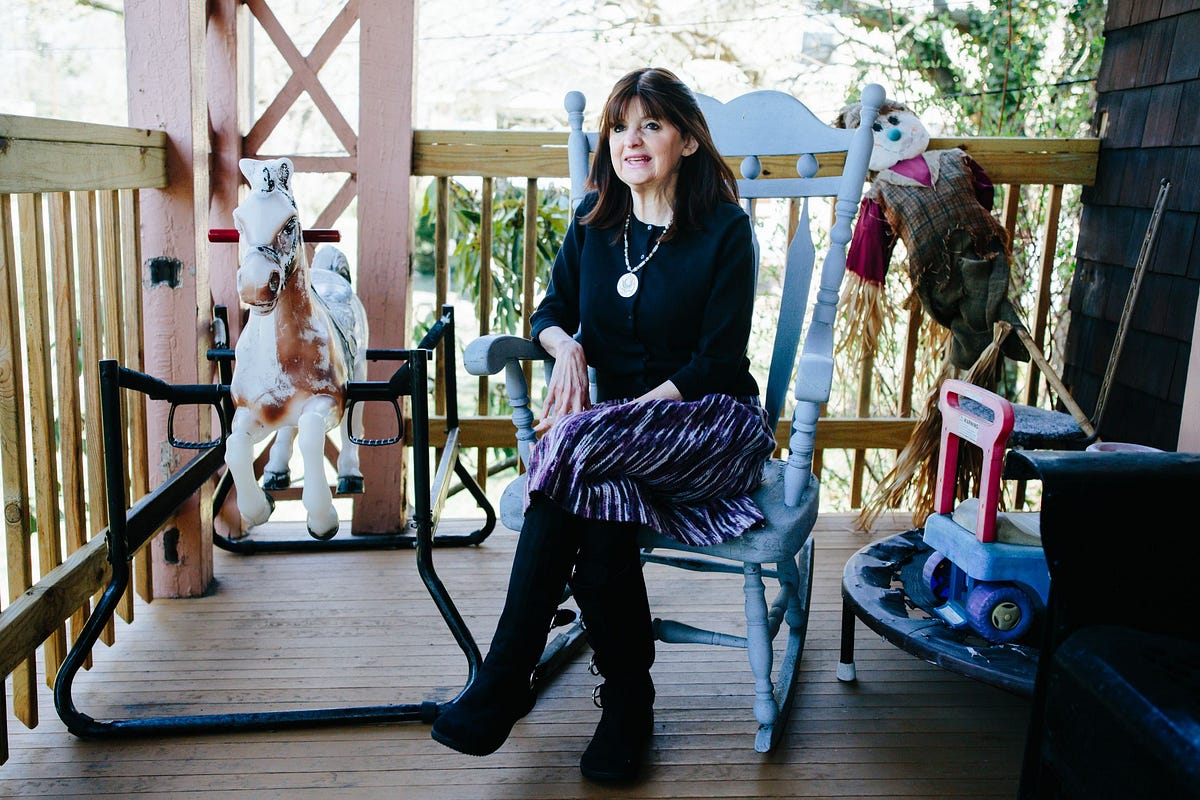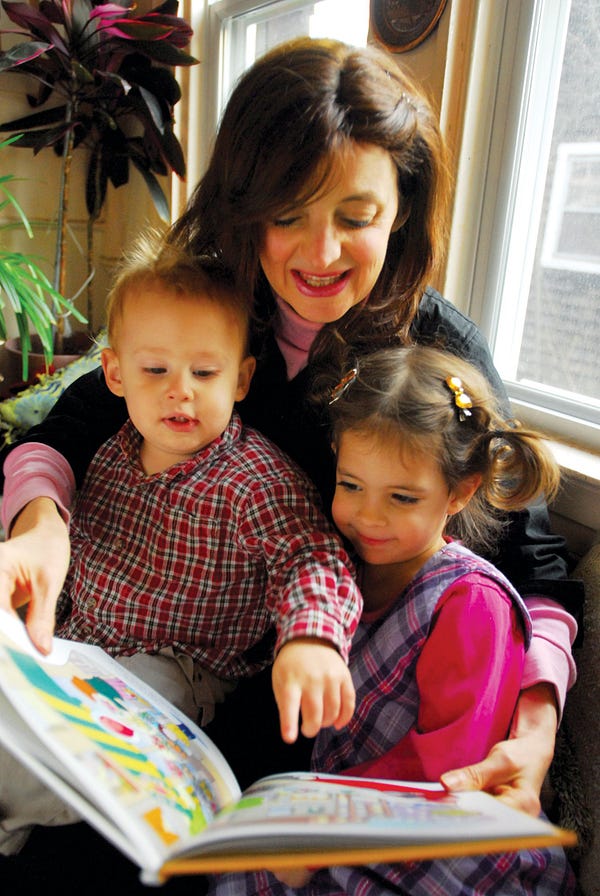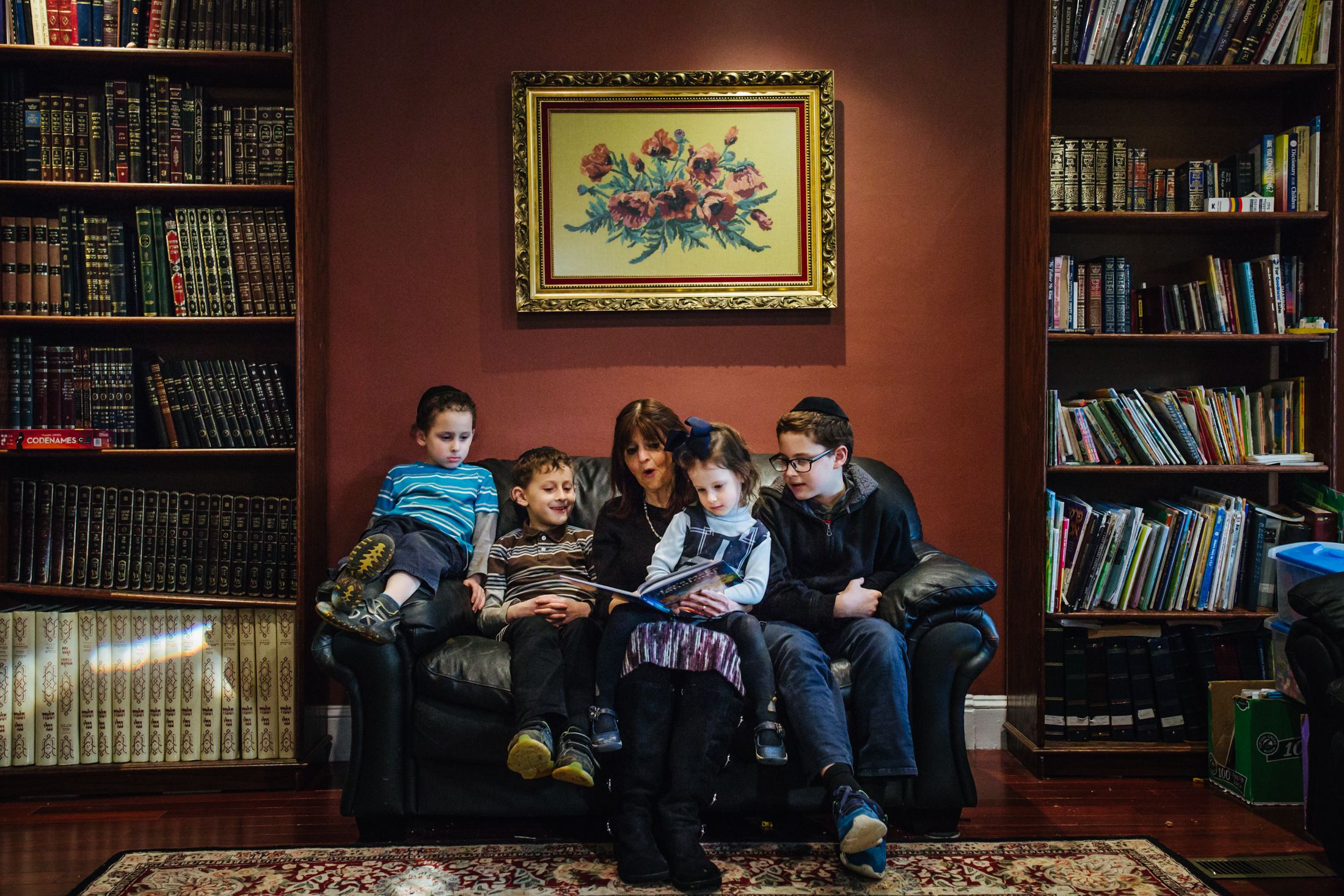After graduating from Harvard, I went to medical school and I was on a respected career track, but I was becoming increasingly more miserable. Even though I seemed outwardly successful, I felt like I was spiritually starving, and this manifested itself in food addictions. In other words, I was in need of greater and more lasting pleasure in my life — not the fleeting pleasure that addictions provide. Eventually I learned how to bring the spiritual nourishment into my life that I was genuinely craving for years.
As a part of my series about “How to Slow Down To Do More” I had the pleasure to interview Bracha Goetz. Bracha is the Harvard-educated author of 37 spiritual picture books that make life’s deepest concepts clear in a simple and delightful way. She is also the author of the candid memoir, Searching for God in the Garbage, based on actual diary entries, that takes readers on an experiential journey to discover how to recover from addictions joyfully — by bringing the greatest pleasure into our lives.
Thank you so much for joining us! Can you tell us the “backstory” about what brought you to this specific career path?
After graduating from Harvard, I went to medical school and I was on a respected career track, but I was becoming increasingly more miserable. Even though I seemed outwardly successful, I felt like I was spiritually starving, and this manifested itself in food addictions. In other words, I was in need of greater and more lasting pleasure in my life — not the fleeting pleasure that addictions provide. Eventually I learned how to bring the spiritual nourishment into my life that I was genuinely craving for years. I yearned to have a family and stay at home, raising my children, while writing the kind of books that I would have wanted to read as a child, making deep spiritual concepts clear. That’s how I came to my joyful career path. My memoir, Searching for God in the Garbage, tells the story of this journey.
According to a 2006 Pew Research Report report, 26% of women and 21% of men feel that they are “always rushed”. Has it always been this way? Can you give a few reasons regarding what you think causes this prevalent feeling of being rushed?
I felt rushed to achieve and move ahead in my career because we tend to take on external parameters of success. I don’t know if it has always been this way, but when we forget that we are spiritual beings housed in bodies, we can easily forget that we have spiritual needs that bring us lasting fulfillment, only when those essential needs are met. So basically I think that we feel rushed when we are not recognizing that we are souls in need of spiritual nourishment to be able to enjoy life fully.
Based on your experience or research can you explain why being rushed can harm our productivity, health, and happiness?
When we feel rushed, we are not flowing through life, and our ideas don’t flow well either. We are not as productive when we feel rushed, in general, even though there are some individuals who get in the habit of procrastinating and only get a “rush” about being productive when they feel rushed. Procrastinators usually wish that they were not that way, however, because procrastinating tends to wreak havoc not only in the procrastinator’s life, but in the lives of those impacted by the procrastinator as well. Procrastinating, and the rushing that ensues, can actually become a type of addiction, as it narrows a person’s life, harming health, happiness, and productivity.

On the flip side, can you give examples of how we can do more, and how our lives would improve if we could slow down?
When we take the time to acknowledge that we are souls that need nurturing to thrive, then we can be more joyfully productive, and that also helps us to optimize our health. For instance, when I take the time to notice and appreciate things in life, whether they are big or small, that’s when new ideas flow into my brain. New neural connections get made, and I have the time to see the connections between things that I never fully saw before. When I am calmly sweeping the floor, looking out the window on a bus ride, or holding and soothing a baby, that’s when creative ideas seem to arise very naturally. When the rushing pauses, we have the time to build meaningful connections.
We all live in a world with many deadlines and incessant demands for our time and attention. That inevitably makes us feel rushed. Can you share with our readers 6 strategies that you use to “slow down to do more”? Can you please give a story or example for each?
- The day begins with taking the time to express gratitude for a new day of life. Jewish wisdom teaches that the first thing we say upon arising are words expressing that we are thankful our soul was returned to us. So right away we recognize that we are souls out to enjoy a spiritual day.
- I’m grateful that I came to learn that my heritage teaches to say blessings throughout the day, filling each day with many moments of appreciation. Here are just a few examples: We say blessings before and after eating a piece of fruit, upon seeing a rainbow, upon seeing the ocean — and even after using the bathroom (taking the time to appreciate that our organs are working well enough that we are able to use the bathroom).
- I try to remember to ask for assistance from the Source of all energy and abundance before doing something important to me. This significant pause takes stress off from my shoulders since it helps me recognize that after I have made my efforts, it is not in my control how things turn out. That frees me to not worry and to be able to freely flow onto the next endeavor in a clear-headed manner.
- Taking the time to stretch throughout the day also helps me to slow down to do more. I’m one of the only people I know who loves red lights because they offer me a great chance to enjoy doing relaxing neck rolls.
- When we are not busy rushing, we also find the time to think of others more. Going more slowly, we can think about another’s circumstances and come up with ways to be helpful to them.
- Ending the day by pausing before falling asleep to take an inventory of the varied ways in which you were able to thrive spiritually, helps you to want to experience more of that same kind of wonderful joy the next day too. It also helps you to sleep more deeply and peacefully.
How do you define “mindfulness”? Can you give an example or story?
In order to experience a moment more fully, we practice mindfulness. This enhances the moment tremendously, as there is much that we are missing in each moment when we are not fully focused on it. Even if you wave your arm right now in an exceedingly slow way, you can get an immediate appreciation for your arm’s ability, which you may have overlooked just a moment before.

Can you give examples of how people can integrate mindfulness into their everyday lives?
Pausing to feel and express gratitude for the multitude of blessings in our lives every day helps us to integrate mindfulness naturally. We can’t expect to practice mindfulness every moment, but we can enjoy every moment that we do practice it!
Do you have any mindfulness tools that you find most helpful at work?
I try to have in mind every day that the purpose of life is to experience the greatest pleasure possible. A corollary to that is my work needs to be enjoyable, and if I am not experiencing it as enjoyable, then I need to figure out how to make it so. When I am not enjoying myself at work, it is usually because I am feeling pressured to rush to do something, so I purposely try to breathe deeply, maybe stretch, and then deliberately slow down to do my work in a much more enjoyable manner.
What are your favorite books, podcasts, or resources that inspire you to use mindfulness tools or practices?
My memoir documents how I came to see and implement that the purpose of life is to experience the greatest pleasure possible. See the thing is, we can experience the deepest and most lasting pleasure through nourishing our souls.
Can you please give us your favorite “Life Lesson Quote”? Can you share how that was relevant to you in your life?
A vital take away from my memoir is the following question which a person can ask themselves when they find themselves overeating. The simple, but illuminating question is this: “Is it my body that is hungry or my soul?” When that question rises to the surface, you suddenly recognize that you were trying to fill your inner emptiness with excessive amounts of temporary pleasure because you were genuinely and desperately craving more pleasure in your life. That craving is real. It is your hungry soul that is trying hard to message you. Once you recognize that, you can bring lasting pleasure into your life that fills the emptiness within.
You are a person of great influence. If you could inspire a movement that would bring the most amount of good to the most amount of people, what would that be? You never know what your idea can trigger. 🙂
There are an infinite number of uniquely delightful ways to nurture our hungry souls. As people come more and more to recognize that addictions have a spiritual basis, they will be able to lead deeply pleasurable lives, freeing themselves from habitual constrictions. Our soul power is way under-utilized, but as we start to engage with it, we become empowered to shine — with kindness, with gratitude, and with unlimited creativity.
Thank you so much for these insights! This was so inspiring!
About the Author:
After 15 years working in Commercial Real Estate in New York City, Ashley Graber changed the coast she lived on and the direction of her life from Real Estate to the worlds of Psychology and Meditation & Mindfulness. Ashley came to these practices after getting sober and in the decade plus since, she now runs a busy mindfulness based psychotherapy practice at Yale Street Therapy in Santa Monica, CA where she see adults and children and speaks on the benefits of meditation and mindfulness practices.
Ashley is an Owner and Director of Curriculum for the next generation meditation app & mindfulness company ‘Evenflow’ and launched the company’s one to one online mindfulness mentoring program. Ashley also educates teachers and administrators in schools and presents in businesses across Santa Monica and Los Angeles.
Ashley was trained in Meditation and Mindfulness practices by prominent teachers; Elisha Goldstein, Richard Burr and Guiding teacher at Against the Stream Boston, Chris Crotty. Her Mindfulness Based Stress Reduction (MBSR) certification was done through The Center for Mindfulness at UC San Diego. Additionally, Ashley is trained by Mindful Schools to teach Meditation and Mindfulness practices to children and families. Ashley’s unique combination of psychotherapy, trauma reprocessing and meditation and mindfulness practices make her a sought after therapist and mindfulness educator and speaker. Her passion for the benefits of mindfulness practices as well as her enthusiasm for helping young kids and adults is the drive to teach these very necessary, life long skills and why she wrote and runs the Mindfulness for Families program at The Center for Mindful Living. This is where she teaches groups of families with children ages 6–12. Ashley was featured on Good Morning LaLa Land, presented on Resilience at the renowned Wisdom. 2.0 Mindfulness & Technology conference, and presented at the TED Woman conference offering an in-depth look at the profound psychological and physiological consequences of chronic stress, and how meditation and mindfulness practices can alleviate these effects.


